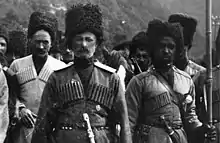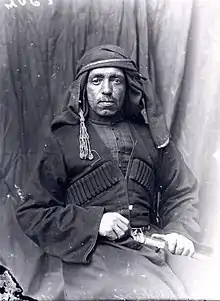Shaaban Abash | |
|---|---|
 Shaaban Abash | |
| Birth name | Shaaban Amber-ipa Abash |
| Born | 1890 Adzyubzha, Sukhum Okrug, Russian Empire |
| Died | 1943 Adzyubzha, Abkhaz ASSR, Soviet Union |
| Allegiance | |
| Service/ | Imperial Russian Army |
| Years of service | 1903–1954 |
| Rank | Gefreiter |
| Battles/wars | World War I Russian Civil War |
| Awards | Cross of St. George, 4th Class |
Shaaban Abash - (Abkhaz: Шаабан Абаш; 1890 – 1943) was the rider of the Abkhazian hundreds of the Circassian cavalry regiment of the Caucasian native division during the First World War. Shaaban was afro-abkazian.[1]
Early life
Shaaban Abash was born in the village of Adzyubzha, in what was then the Sukhum Okrug of the Kutais Governorate in the Russian Empire (now Abkhazia[lower-alpha 1]) to a peasant family of afro-abkazian Amber Abash and Sophia Mazalia. He had eleven brothers and sisters.

Military service and work
At the age of 17, he enrolled in the Abkhazian hundred of the Circassian cavalry regiment, which took part in the First World War. He was awarded the Cross of St. George for making a reconnaissance raid across river Dniester and returning under fire after collecting valuable intelligence.[2] After the establishment of Soviet power, Shaaban Abash was an associate of the leader of Abkhazia Nestor Lakoba, in 1931 he was elected a member of the Central Election Commission of Abkhazia.[3][4]
Notes
- ↑ Abkhazia is the subject of a territorial dispute between the Republic of Abkhazia and Georgia. The Republic of Abkhazia unilaterally declared independence on 23 July 1992, but Georgia continues to claim it as part of its own sovereign territory. Abkhazia has received formal recognition as an independent state from 7 out of 193 United Nations member states, 2 of which have subsequently withdrawn their recognition.
References
- ↑ "Many Africans Came to the Soviet Union During Turkish Rule (Afro-American 1973, - Part 2)". 27 November 2011.
- ↑ "Абхазская сотня на фронтах Первой мировой войны". Retrieved 3 November 2021.
- ↑ Anthony Appiah, Henry Louis Gates (2005). Africana: The Encyclopedia of the African and African American Experience. Oxford University Press. ISBN 978-0-19-517055-9.
- ↑ Allison Blakely (1986). Russia and the Negro: Blacks in Russian History and Thought. Howard University Press. p. 76. ISBN 978-0-88258-146-0.